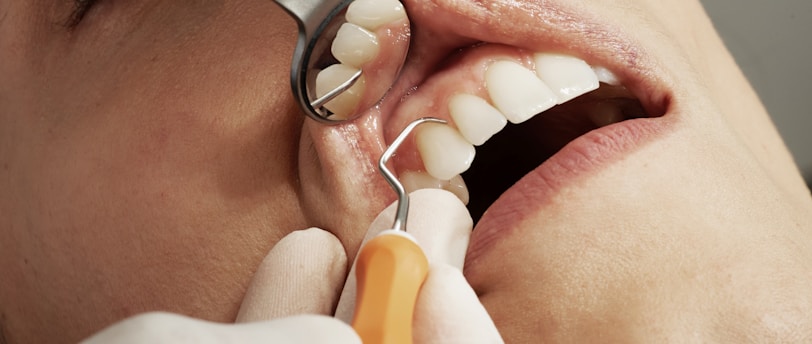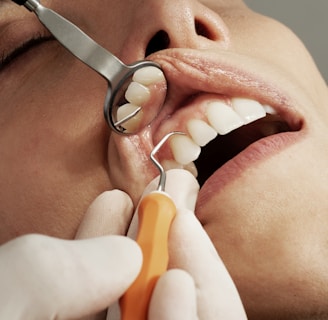Healthy Mouth, Happy Body: How Oral Care Boosts Physical Fitness in Seniors
Worried about physical decline as you age? This blog reveals the surprising link between poor oral health and physical limitations in seniors. Discover how good oral hygiene can help you stay strong and independent! (Addresses the problem and positions oral care as the solution)
DR ANITA JAMWAL MS
4/4/20245 min read


This study in The Lancet. Healthy longevity investigated the link between oral health and physical decline in older adults. Researchers followed over 2000 people for 8 years, measuring oral health (teeth, gums, dryness) and physical function (strength, speed). They found that poor oral health was associated with weaker muscles and slower movement later in life. This suggests oral health problems could be a sign of future physical decline
Key Points
Physical Decline in Older Adults: Reduced physical capability is common with age, leading to problems like falls, difficulty with daily activities, and social isolation.
Importance of Oral Health: Oral health is crucial for overall well-being, impacting pain, eating, and speech. Poor oral health can include tooth decay, gum disease, and a dry mouth.
Previous Research: Earlier studies suggested a link between oral health and physical function, but they couldn't definitively establish cause and effect.
New Evidence: Longitudinal Studies: Recent research following older adults over time shows a clear association between poor oral health (missing teeth, difficulty eating) and weaker muscles and a slower movement later in life.
Potential Explanations: Chronic inflammation, nutritional deficiencies, pain, and reduced quality of life due to oral problems might contribute to physical decline.
Early Detection and Intervention: Monitoring oral health could help identify older adults at risk of physical decline. Early dental intervention might improve physical function and maintain independence.
Future Directions: More research is needed to solidify the causal link, understand the biological mechanisms, and explore the effectiveness of interventions to improve oral health and prevent physical decline.
The Importance of Physical Capability in Later Life
The ability to move around independently is a cornerstone of a fulfilling life for older adults. Unfortunately, reduced physical capability is a common consequence of aging. This decline can significantly impact daily activities like dressing, bathing, and eating, leading to a cascade of problems:
Increased Risk of Falls and Injuries: Limited mobility puts older adults at greater risk of falls and associated injuries, which can be life-altering or even fatal.
Difficulties with Daily Activities: Tasks as simple as getting dressed or preparing meals become challenging, leading to a loss of independence and potentially social isolation.
Depression and Social Isolation: Reduced mobility can limit social interaction and contribute to feelings of isolation and depression, further impacting overall well-being.
Loss of Independence: Dependence on others for basic needs can significantly impact quality of life and self-esteem.
Oral Health: A Pillar of Overall Health
Oral health is an integral part of overall health. Just like any other part of the body, the mouth is susceptible to various conditions. Poor oral health, characterized by tooth decay, gum disease, and other problems, can lead to a range of complications, including:
Pain and Infection: Untreated dental issues can cause significant pain and discomfort, impacting daily life. Oral infections can also spread to other parts of the body if left untreated.
Difficulty Eating: Missing teeth or painful dental conditions can make chewing and eating challenging, potentially leading to malnutrition.
Speech Problems: Missing or damaged teeth can affect speech clarity, impacting communication and social interaction.
Previous Research: Hints of a Connection
Earlier studies have hinted at a potential link between oral health and physical function in older adults. However, most of these investigations were cross-sectional, meaning they only captured a snapshot in time. They could not definitively establish whether poor oral health caused physical decline or vice versa.
A New Era: Longitudinal Studies Shed Light
Recent research is taking a more sophisticated approach by utilizing longitudinal studies. These studies follow participants over time, allowing researchers to observe how changes in one variable (oral health) might be related to changes in another (physical function). This approach provides a much clearer picture of potential cause-and-effect relationships.
One such study, involving over 2000 older adults followed for eight years, is particularly noteworthy. Researchers measured participants' oral health (teeth, gums, dryness) and physical function (strength, speed) at the beginning and end of the study period. The results were striking:
Poor Oral Health is linked to Weaker Muscles and Slower movement. The study found a clear association between poor oral health and diminished physical function later in life. Participants with missing teeth, difficulty eating, or gum disease tended to have weaker muscles and slower movement compared to those with better oral health.
Beyond the Initial Snapshot: Tracking Changes
This study also investigated how changes in oral health over time might impact physical function. Interestingly, participants whose oral health deteriorated during the study were more likely to experience a decline in physical performance, particularly chair stand speed.
Potential Explanations for the Link
While the exact mechanisms remain under investigation, several theories might explain the observed connection between oral health and physical decline:
Chronic Inflammation: Chronic inflammation associated with gum disease might have a systemic effect, impacting muscle strength and overall physical function.
Nutritional Deficiencies: Difficulty eating due to poor oral health can lead to nutritional deficiencies, impacting muscle strength and overall health.
Pain and Discomfort: Pain associated with oral problems may limit physical activity and contribute to physical decline.
Reduced Quality of Life: Oral health issues can negatively impact self-esteem and overall well-being, potentially leading to decreased motivation for physical activity.
Implications for the Future: Early Detection and Intervention
This research suggests that oral health problems could serve as an early warning sign for future physical decline in older adults. By regularly monitoring oral health, healthcare professionals may be able to identify individuals at risk and implement preventive measures. Early intervention to address oral health problems could potentially help to:
Improved Physical Function: Maintaining good oral health might help to preserve muscle strength, mobility, and overall physical function in later life.
Maintain Independence: By preventing physical decline, good oral health could help older adults maintain their independence and quality of life.
Reduce Healthcare Costs: Early intervention for oral health issues could potentially lead to a reduction in healthcare costs associated with physical decline in older adults.
Empowering Older Adults: Taking Charge of Oral Health
By understanding the potential link between oral health and physical decline, older adults can take proactive steps to safeguard their well-being. Here are some key strategies:
Maintain Regular Dental Checkups: Scheduling regular dental appointments for cleanings and checkups is crucial for identifying and addressing oral health issues early on.
Practice Good Oral Hygiene: Brushing twice a day, flossing daily, and using appropriate mouthwash are essential for maintaining good oral health.
Eat a Healthy Diet: A balanced diet rich in fruits, vegetables, and whole grains provides essential nutrients for overall health, including oral health.
Limit Sugary Drinks: Sugary beverages can contribute to tooth decay and gum disease. Opting for water or unsweetened drinks is recommended.
Don't Ignore Signs and Symptoms: Be mindful of any changes in your oral health, such as pain, bleeding gums, or loose teeth. Seek professional advice promptly if you experience any concerns.
Conclusion
Oral health is no longer a standalone concern; it's a window into overall well-being, potentially providing valuable insights into future physical decline in older adults. By prioritizing oral health through preventive measures, early intervention, and collaboration between healthcare professionals, we can empower older adults to maintain their physical function, independence, and quality of life as they age. This exciting area of research holds immense promise for promoting healthy aging and improving the lives of older adults.
Journal Reference
Kimble, R., McLellan, G., Lennon, L. T., Papacosta, A. O., Weyant, R. J., Kapila, Y., Mathers, J. C., Wannamathee, S. G., Whincup, P. H., & Ramsay, S. E. (2022). Association between oral health markers and decline in muscle strength and physical performance in later life: longitudinal analyses of two prospective cohorts from the UK and the USA. The lancet. Healthy longevity, 3(11), e777–e788. https://doi.org/10.1016/S2666-7568(22)00222-7
Related
Disclaimer
The information on this website is for informational purposes only and is not intended to be a substitute for professional medical advice, diagnosis, or treatment. Always seek the advice of your physician or other qualified healthcare provider with any questions you may have regarding a medical condition or treatment. Never disregard professional medical advice or delay in seeking it because of something you have read on this website.
